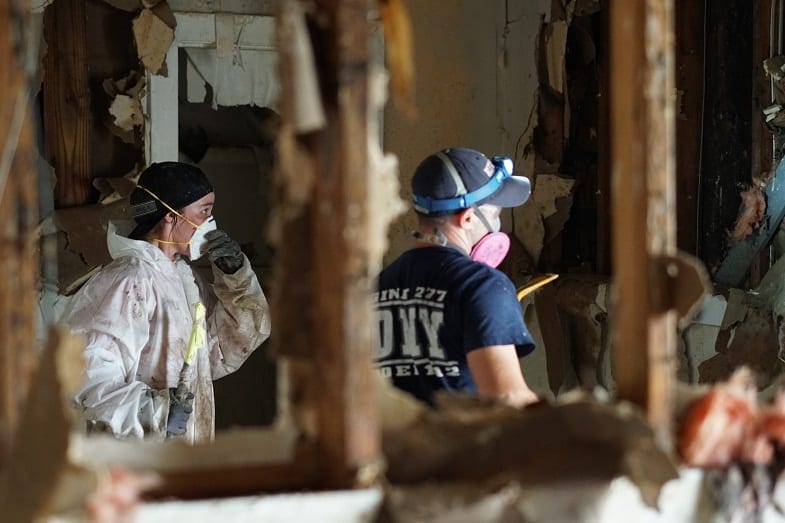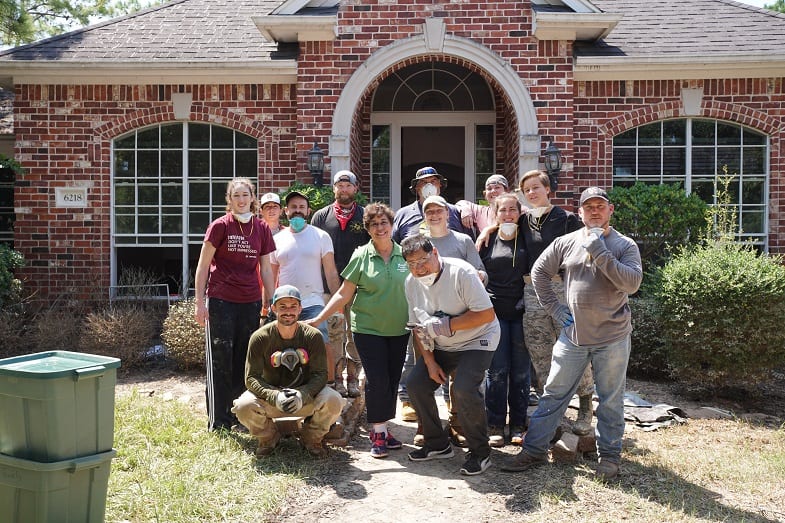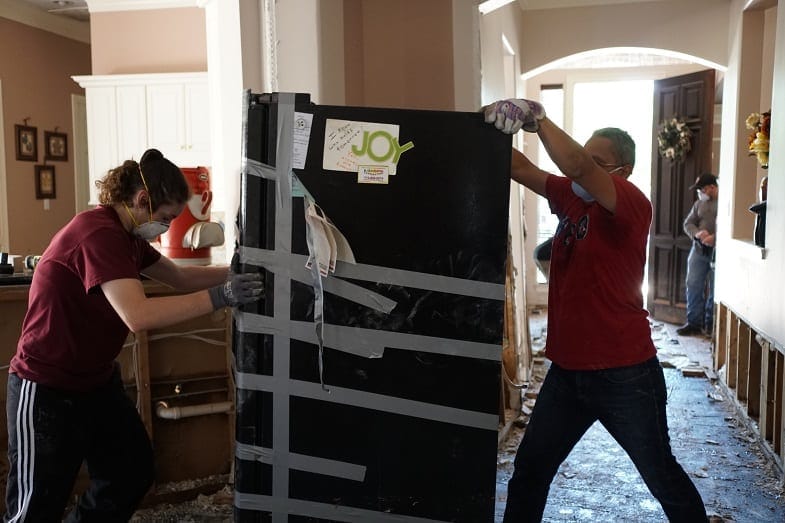There are few things we can truly count on in this world. We can count on Santa Claus bringing a smile to the faces of little kids. We can count on the weatherman being right about the rain when we forget our umbrella at home, your cell phone having no bars when you really need to get in touch with someone, and your cable going out during the fourth quarter of at least one game every season.
More importantly, we can also count on people from all walks of life coming together to help out our fellow man when natural disasters like Hurricane Harvey, Irma and Maria strike. Yes, they often bring out the terrible in people as well. Several stories have circulated on social media about looters taking advantage of people who were forced to evacuate and leave everything behind.
But with the bad has come an immense amount of good. Everyone has heard of the fundraiser Houston Texans defensive lineman J.J. Watt started. The original goal as to raise $500,000, to which he kicked in the first $100,000, but in the end, it topped out at over $37 million!
Many athletes, coaches and team owners contributed money to Watt’s fund, the Red Cross and other fundraisers. Some, like Tom Brady and Bill Belichick, did so quietly. They were not concerned with the publicity; they just wanted to help.
It is heart-warming to have seen so many athletes and other celebrities getting involved and trying to do something to help. But lost in the shuffle is another group of athletes that are just doing whatever they can to pitch in. They aren’t paid millions of dollars to play their game. In fact, playing cost them a little money every season.
They are not going to be on SportsCenter anytime soon, and the only people that have heard of them are friends, family, loved ones, ex-loved ones and their opponents. Their anonymity has nothing to do with their physical prowess or ability to play their game.
For some crazy reason, Americans just haven’t embraced the great sport of rugby like they have other contact sports. But the people that have been helped by these dedicated amateur athletes are probably fans for life—not to mention incredibly thankful for the organization that brought them some much-needed help.
Rugby Relief.

How it came to be
It all began in pretty simple fashion. In August 2016, after severe flooding impacted several communities in the Baton Rouge, Louisiana area, some of the ladies from the Louisiana Lagniappe Women’s Rugby team began doing what they could to help those in need. They delivered food to people throughout the community, helped with guttting houses, and raised over $9,000 with a GoFundMe page.
Members of several teams (from Louisiana as well as other states) began to chip in with the gutting and clean-up efforts.
By the end of the month, several of the volunteers began to see the potential for an organization that could mobilize the rugby community. The difference a group of strong, hard-working and dedicated volunteers could make after future natural disasters—it’s nothing short of heroic.
There is no glory to be had or invitations to come on ‘Ellen’ or any other television show. They knew they were not likely going to be praised by millions of people.
They helped the folks in Baton Rouge for one reason. It just so happens to be the same reason they decided to help others in the future.
It’s the right thing to do.
In September of 2016, with a group of volunteers from the Louisiana Lagniappe, the Austin Huns and Austin Valkyries — along with Faith ‘Chief’ Federspiel, a Chief Master Sergeant in the Air Force– Rugby Relief was born.
The organization
Rugby Relief is governed by a five-person board of directors made up of some of the founding members (Justin Pidgeon – President, Nicki Button – Vice President, Nicole Brown – Director of Operations, Laura Sau – Treasurer, Faith Federspiel – Secretary).

While it would be tempting to expand quickly, they are taking a measured approach to growth. They want to take the steps necessary to ensure continued and long-lasting success (i.e., establishing a leadership structure, integrating with local teams, etc.). Yes, doing something now would be great. But creating a healthy organization that can help people for years to come is even better.
For now, their efforts are focused in FEMA regions IV and VI (Southeast and South Central United States). The hope is to move into each of FEMA’s ten regions eventually. It may take some time. But that is because they don’t want to expand until they have a solid foundation in place. They’d rather be successful and lasting than quick and fleeting.
Success?
During the organization’s short life, it has mobilized volunteers on three different occasions. There was the flooding in Louisiana that gave birth to Rugby Relief. They also pitched in when tornadoes hit in Hattiesburg, Mississippi and New Orleans, and most recently, Hurricane Harvey. About 120 volunteers turned out following the floods and helped about 40 homes. About 30 volunteers turned out following the tornadoes and helped five homes. In the Houston area, over 165 volunteers responded to help work on 57+ homes (and counting).
Of course, most of the volunteers come from local teams. But teams from all over the country have sent volunteers and/or donations. So far, over 35 teams have contributed in some way, shape, or form.
“We have coordinated teams of volunteers from the rugby community to help those affected by the flooding to do what is commonly called “mucking” their homes,” Justin Pidgeon, President of Rugby Relief, tells Sports Retriever. “This involves removing everything from the home that is wet, including drywall, cabinets, insulation, furniture, and anything else that may have been affected by the flood. So far Rugby Relief volunteers and local ruggers that we have coordinated with have mucked more than 50 homes in Houston, Galveston, and surrounding areas.”
It is important to note that recovering from natural disasters takes time. The destruction only takes moments, but the repairs can take months. Rugby Relief volunteers worked on houses following the Louisiana floods for two months.

Getting involved/getting help
So far, volunteers have been found and identified primarily through social media. Facebook makes it is easy to reach out to teams in an area affected by disasters like Hurricane Harvey. Several teams in the Houston area responded to the call for help and have pitched in.
Forms are available online for people interested in becoming volunteers in the future. When disaster strikes, coordinators get in touch with volunteers and get them organized and ready to work.
Requesting help is also simple. All someone needs to do is fill out a form online. Whether they have any ties to the rugby community is not important. But they do target those with the greatest need first.
Future?
So far, volunteers have primarily been active in Texas and Louisiana. But in the wake of Irma, efforts have been made to mobilize volunteers in Florida, South Carolina and Georgia. Rugby Relief is also trying to make a difference in the Caribbean through a partnership with Rugby Americas North.
Ideally, the organization hopes to go nationwide and maybe even international. For the immediate future, the plan is to get the ball rolling in other areas of the country. When asked about his vision for the future of the organization, Pidgeon told Sports Retriever that, “based on the incredibly positive reception we have had from all across the rugby community, we hope Rugby Relief can become a national and international organization that fosters volunteerism from rugby players all over the world.
“Our goal is to create a network of strong, hardworking people to aid in the response, relief, and recovery for communities who have suffered from disasters. Through volunteerism, we also hope to strengthen the already vibrant national and international rugby community, while spreading awareness of the sport and its values of inclusiveness, teamwork, and comradery.”
If all goes according to plan, the next time Mother Nature lashes out, besides your first responders and J.J. Watt, your friendly neighborhood rugby team could be coming to the rescue.

The greatest NBA dynasties of all time
The goal for any basketball franchise is to build a dynasty that fans and experts will be talking about for











